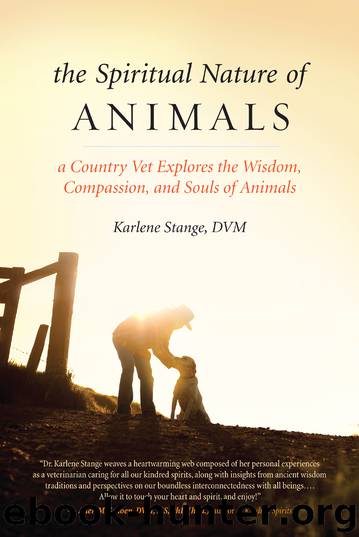The Spiritual Nature of Animals by Karlene Stange

Author:Karlene Stange
Language: eng
Format: epub
Publisher: New World Library
How to End Suffering
The Four Noble Truths are the main teachings of the Buddha about suffering and how to end it. To relieve suffering, we must first realize that suffering exists — that is truth number one. There are three kinds of suffering.28 The first is the physical kind associated with pain from trauma, sickness, and aging (dukkha-dukkha). Both humans and animals suffer physical pain.
The second kind of suffering is due to change (viparinama-dukkha). Everything decays or falls apart; everything that’s joined gets separated. We all suffer from the loss of loved ones and from losing things such as cars. Animals do not cling to objects as desperately as we do. However, a horse will run the fence for hours wanting to follow a companion that left the pasture; a dog will destroy a house over “separation anxiety”; and a wolf will howl for days over the loss of its mate. Animals also experience the suffering caused by change.
The third kind of suffering is the suffering due to conditioned states (samkhara-dukkha). Perhaps humans suffer more from this kind than animals do because, for example, as soon as we get a car, we worry about it being scratched, stolen, or dirtied. This is how a pleasurable thing can cause pain in the midst of pleasure. We project worry into the future. House pets become anxious when their people pack a suitcase, and horses get excited when a horse trailer arrives. People worry themselves sick, and domesticated animals sometimes do the same. Wild beasts become so frightened when captured that they may die from the stress. Although animals face concerns about possible future scenarios, such as the fear of prey, they seem less likely to worry for days about something they did or what may happen next week, as humans do. Animals appear to be more present in the now.
Thich Nhat Hanh suggests that we should behave more like wild animals when we have health problems. “When animals in the forest get wounded, they find a place to lie down, and they rest completely for many days. They don’t think about food or anything else. They just rest, and they get the healing they need. When humans get sick, we just worry! We look for doctors and medicine, but we don’t stop. . . . Just allow your body and mind to rest like an animal in the forest. Don’t struggle.”29
The Second Noble Truth describes the origin of suffering. We must realize that we create our own suffering by worrying and struggling over things and events that are impermanent, ever-changing mental constructs. Animals provide a good example of how to release attachments more easily. In the Dhammapada, the Buddha describes freedom from desire and sorrow: “Like a swan that rises from the lake, with his thoughts at peace he moves onward, never looking back.”30
The Third Noble Truth describes the way to end suffering. We must change our minds to rid ourselves of delusions. Buddhist meditation practices provide the way to end suffering.
Download
This site does not store any files on its server. We only index and link to content provided by other sites. Please contact the content providers to delete copyright contents if any and email us, we'll remove relevant links or contents immediately.
The Power of Now: A Guide to Spiritual Enlightenment by Eckhart Tolle(5742)
The Miracle Morning by Hal Elrod(4705)
Rising Strong by Brene Brown(4444)
Being Aware of Being Aware by Rupert Spira(3271)
The Secrets to Charisma and Personal Magnetism: Learn a hidden energy tradition to become magnetically attractive and vitally alive by Martins Bruno(2684)
A New Earth: Awakening to Your Life's Purpose by Eckhart Tolle(2640)
The Lost Art of Good Conversation by Sakyong Mipham(2638)
The Gifts of Imperfection by Brene Brown(2556)
The Songlines by Bruce Chatwin(2548)
The Power Of Now by Eckhart Tolle(2213)
All Things New by John Eldredge(2150)
The Nature of Consciousness by Rupert Spira(2087)
The Empath's Survival Guide by Judith Orloff(2052)
The Untethered Soul: The Journey Beyond Yourself by Singer Michael A(2051)
Thoughts Without A Thinker: Psychotherapy from a Buddhist Perspective by Epstein Mark(2007)
The Seat of the Soul by Gary Zukav(1985)
Practicing the Power of Now by Tolle Eckhart(1922)
The Yoga of Jesus: Understanding the Hidden Teachings of the Gospels by Paramahansa Yogananda(1845)
Be Feel Think Do by Anne Berube(1811)
